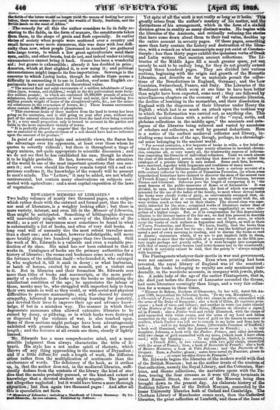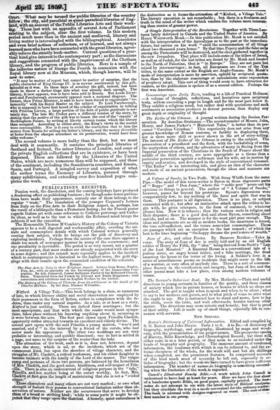EDWARDS'S MEMOIRS OF LIBRARIES.*
Two bulky volumes of nearly two thousand pages, on a subject which rather deals with the outward and formal part, than the in- ner soul ifesnotra of .Libraries ; including a Handbook of Library Economy. By Ed- wasdikiwards._ to two volumes. Published by Triibnar. . Yet spite of all the work is not really so long 'as it looks. This greatly arises from • the author's mastery of his matter, and the distinctness of his arrangement, which in the form of a sixfold division gives in reality as many distinct works. He begins with the libraries of the Ancients, and critically reducing the stories that have come down about them to their real value, doubles up the entire account in seventy pages. Of these pages, something more than forty contain the history and destruction of the libra- ries, with a remark on what manuscripts may yet exist at Constan- tinople ; less than thirty pages exhibit the ipsissima verba of Greek and Latin writers that mention ancient collections. The Li- braries of the Middle Ages fill a much greater space, yet can, sarcely be said to be unduly long, for they do not greatly extend beyond three hundred pages. They are divided into various sections, beginning with the origin and growth of the Monastic Libraries, and describe as far as materials permit the collec- tions of the Benedictines in England, Germany, and the Low Countries, Switzerland, France, and Italy. The Libraries of the Mendicant orders, which seem at one time to have been better than might have been expected, come next ; they are followed by miscellaneous chapters on the economy, of the monastic libraries, the decline of learning in the monastries, and their dissolution in England with the dispersion of their libraries under Henry the Eighth ; which last is as much an attack upon the reckless way in which the Reformation was carried out, as anything else. This media' nal section doses with a notice of the " royal, noble, and plebeian collections in the middle ages," the accounts and cata- logues of the libraries being relieved and varied by anecdotes of scholars and collectors, as well by general deductions. Here is a notice of the earliest mediaeval collector and library, in- cluding some touches of the age, though, perhaps, in a chronologi- cal sense belonging to the ancient world. " For several centuries, a few bequests of books in wills, a few brief en- tries of them in inventories, and some scanty allusions in monkish chroni- cles, comprise all, or very nearly all, the trustworthy sources of informa- tion respecting the libraries of individual collectors. Until we reach almost the close of the mediaeval period, anything that deserves to he called the catalogue of a private library is rare indeed. Some such lists, however, have survived, together with fragments and traditions of many more. ".In the Letters of Sidonius Apollinaris we have a curious account of a fifth-century collector in the person of Tonantius Ferreolus, (in whom some hypothetical historians have claimed to discover the stem of the second race of French Bings,) who formed a library in his castle of Prusiana, between Nismes and Clermont. Sidonius goes the length of comparing it to the most famous of the public museums of Rome or of Alexandria.' It was divided, he says, into three departments, the first of which was expressly intended for the use of the ladies of the family, to meet whose devout tastes the books were chiefly works of piety, so conveniently arranged that, al- though these ladies had at command as many as they could wish for, all were within reach as they sat in their chairs. The second class was espe- cially intended for the men ; comprised works of literature rather than of devotion, and such (adds the sainted poet, very ungallantly) as were alto- nether of a higher range. But, as if in compensation for this depreciatory allusion to the literary tastes of the fair sex, we find him proceed to describe a third department, destined for the common use of both sexes, in which occur the works of such authors as Augustine and Origen, as well as those of Varro Prudentius, and Horace. We learn, finally, that the books thus collected were not for show but for use; it was the habitual practice to spend a part of every morning in readirg, and to discuss the books so read at dinner; statements which, if we are to put implicit faith in them, would tend to show that the table-talk of a country-house in the fifth cen- tury might perhaps not greatly suffer, if it were brought into comparison with that of many country-houses (and town-houses too). in the nineteenth; of which it certainly cannot be said, that the gaiety always mingled with learning.' " The Plantagenets whatever their merits in war and government, were not eminent as collectors. Even when printing had been invented, the royal library of England was of the scantiest; indeed, the books belonging to royalty are only mentioned inci- dentally, in the wardrobe accounts, in company with jewels, plate, &o. Amohle lady of the age of the earlier Plantagenets, that is, she died just before,the House of Lancaster ascended the throne, had more literature seemingly than kings, and a very fair collec- tion for w woman in those times. "Eleanor de Behun, Duchess of Gloucester, by her will, dated 9th Au- gust 1399,bequeathed the following books, To my son, Humphrey..... a Chronicle of France, in French, with two clasps. n silver, enamelled with the arms of the Duke of Burgoyne ; also a book of Giles, De regimine.prin- einem ; a beck of vices and virtues ; and another in verse (un autre rimeie) of the History of the Knight of the Swan, (Hiatoire de chivaler a sign,;all in ; also a _Psalter well and richly illumined, with the clasps of gold enamelled with white swans, and the arms of my Lord and father enamelled on the clasps, and other bars of gold on the tissues in manner of mullets, Which Psalter was left ins to remain to my heirs and from heir to heir ; . . . . and to my daughter, Anne, (afterWirds Countess of Stafford,) a book well illumined, with the Legenda aurea in French ; . . . . to my daughter, Johanna, a book with the Psalter, Primer, and other devotioni4 with.two clasps of gold enamelled with my arms, (which book I have often used,) with my blessing ; . . . . To my daughter, Isabel, (a minoress,) . . . a French Bible,. in two volumes, with two gold clasps, enamelled with the arms of France ; item, a book of Decretals in French ; also a book of Meistre Histeires, a took de Vitis Patrum ; and the Pas/ord.: of St. Gregory. Item, a Psalter; glean; mitre livre novel du Psautier, gloses de la primer . . . . et souut les-elites Byres de Francois.' " Mr. Edward.4 begins the libraries of the modern world with that of the British Museum.; but as the author treats of the nucleus of that collection, namely the Royal Library, and the Cottonian, Har- leian, and Sloane collections, the narrative opens with the Tu- dors, tracing the four streams as it were till they terminate in Great Russell Street, the account of the Museum being then brought down to the present day. An elaborate history of the Bodleian follows that of the British Museum, sueceeded by the lesser University libraries both of Oyfera and Cambridge. The Clietha.m Library of Manchester comes next, then the. Cathedral libraries, the great collection at Lambeth, and those of the Inns of Court. What may be termed the public libraries of the country follow ; the city, and parochial or quasi-parochial libraries of Eng- land, with an account of the Publio Libraries Acts and their work- ing. These last with an appendix of several Acts of Parliament relating to the subject, close the first volume. In this modern period much more than in the ancient and mediaeval, literary and living matter is intermingled with the bibliographical. Anecdotes and even brief notices of collectors, or of learned, and not always learned men who have been connected with the great libraries, agree- ably relieve the strictly book-matter. Current questions of a prac- tical kind give interest to the contemporary part ; as the discussions and suggestions connected with the improvement of the Chetham library, and the progress of public libraries. Here is a sample of the indoctus nature of George the Fourth in connexion with the Royal library now at the Museum, which, though known, will be new to some. "It may be matter of regret but cannot be matter of surprise, that the public character of King George IV. is in nowise ameliorated by this gift, splendid as it was. In these days of scrutiny the gift, iudeed, has been made to throw a darker tinge into what was already dark enough. The library, it now appears, was to have been sold to Russia. But Lords Liver- pool and Farnborough strenuously opposed such a national disgrace. The former, then Prime Minister, is said to have been forced to expostulate ve- hemently' with his Royal Master on the subject. To Lord Farnborough, Who is supposed to have first heard of the scheme of expatriation in talking with Princess Lieven, a large portion of the debt of public gratitude is cer- tainly due. The late Mr. Croker gave a different version of the story, by stating that the motive of the gift was to lessen the cost of the repairs' of Buckingham Palace, by setting at liberty certain rooms which the library then occupied. According to either story, the King's views in the matter were contemptible. Nor is it easy to avoid the conviction that to him the money from Russia for selling his father's library, and the money divertible at home from the charges attendant on its preservation, would have been alike welcome." The second volume is more bulky than the first, but we must deal with it summarily. It contains the principal libraries of Scotland and Ireland, the minor libraries of London, and some of the private English collections that are in existence, or have been dispersed. These are followed by the Libraries of the United States, which are more numerous than will be supposed, and those of the continent, including the Scandinavia countries, and Russia, Spain, and Portugal. A mingled survey and exposition of what the. author terms the Economy of Libraries, pursued through many subdivisions, and extending over five hundred pages com- pletes the work.



























 Previous page
Previous page